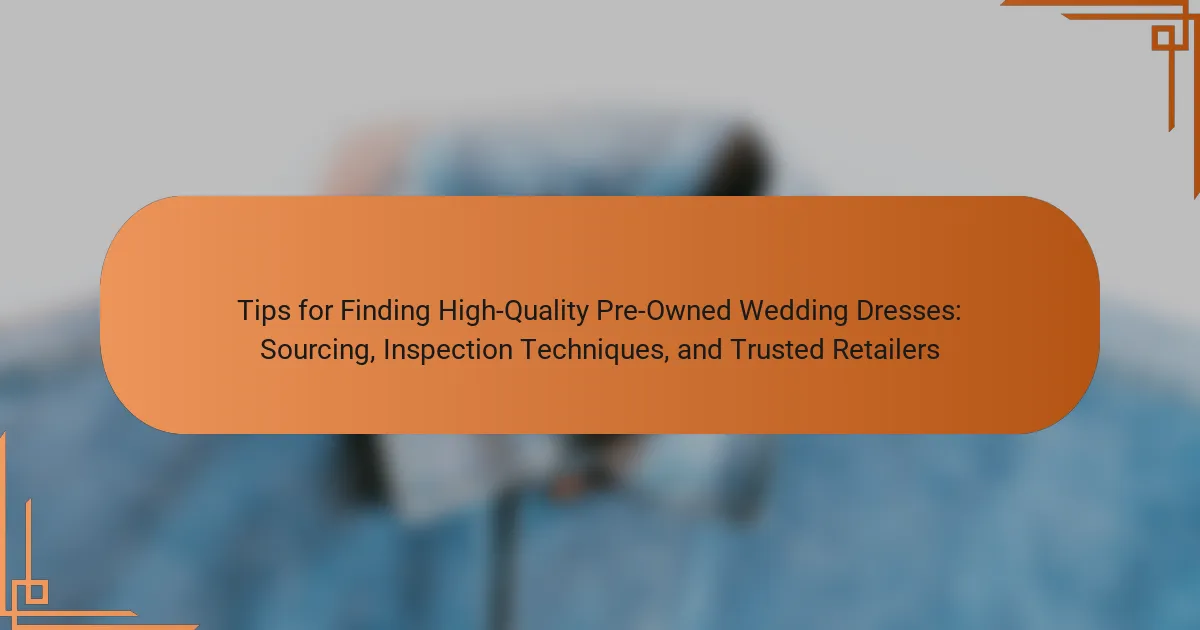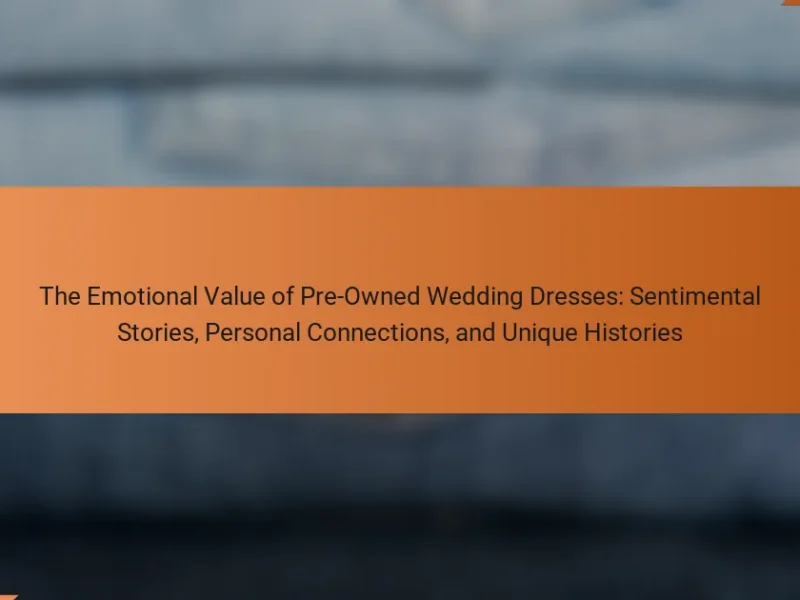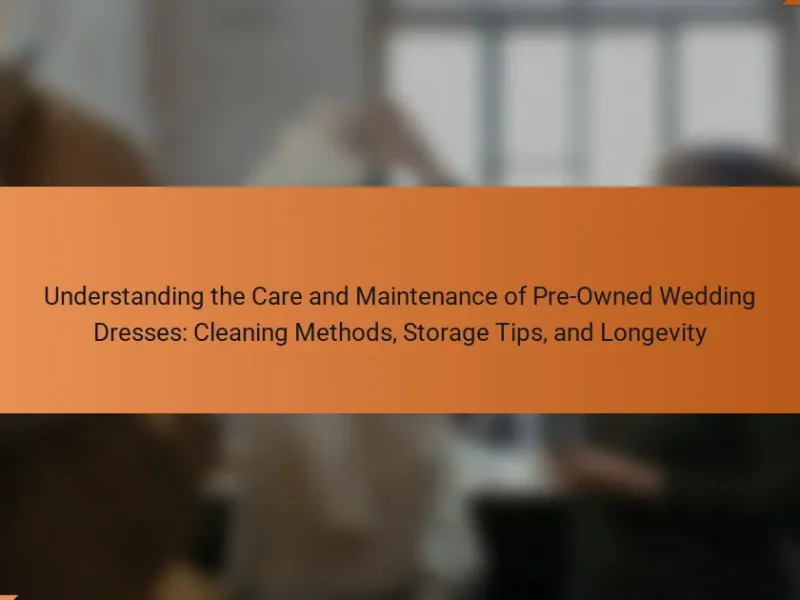High-quality pre-owned wedding dresses are previously worn gowns that retain excellent condition and craftsmanship, often featuring designer labels and unique styles. This article provides essential tips for sourcing these dresses, including reliable online marketplaces, consignment shops, and local boutiques. It also outlines effective inspection techniques to ensure quality, such as examining fabric for stains, checking for damage, and assessing the overall cleanliness of the dress. Additionally, the article highlights the growing market for pre-owned wedding dresses, emphasizing the sustainable and cost-effective benefits for brides seeking stylish options.
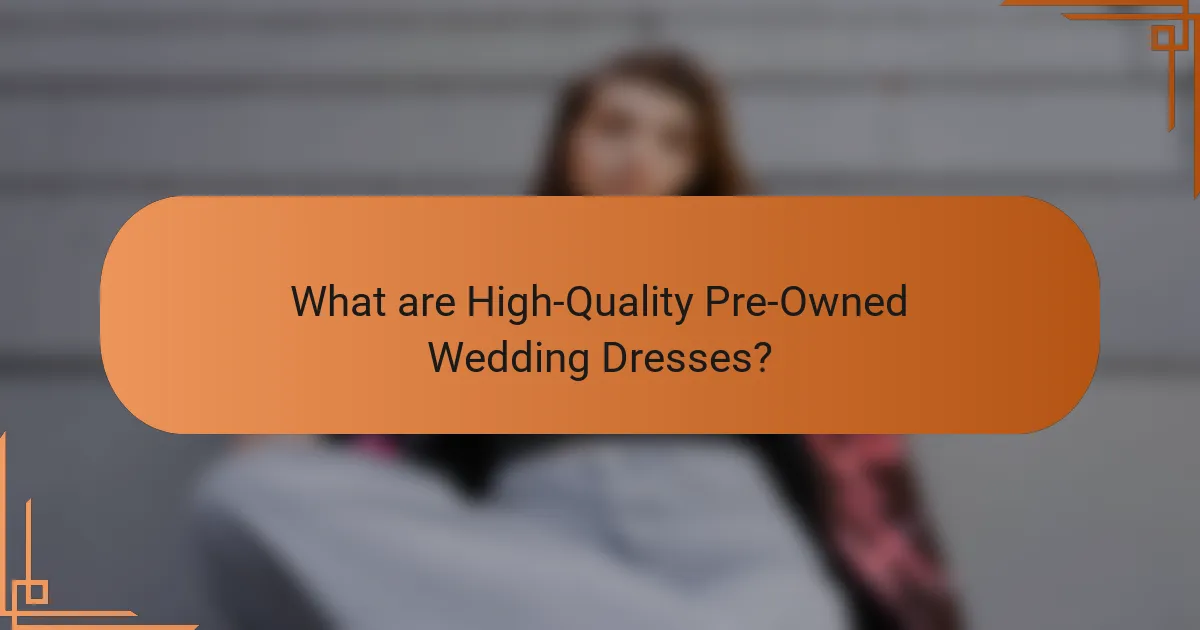
What are High-Quality Pre-Owned Wedding Dresses?
High-quality pre-owned wedding dresses are previously worn gowns that maintain excellent condition and craftsmanship. These dresses often feature designer labels and unique styles. They are typically made from high-quality fabrics and materials. Many pre-owned dresses have minimal signs of wear, making them a sustainable option for brides. Purchasing these dresses can offer significant savings compared to buying new. The market for pre-owned wedding dresses has grown, with many retailers specializing in curated selections. Brides can find dresses that are both stylish and affordable through online platforms and consignment shops. Quality assurance often includes thorough inspections for any damage or alterations.
How can you identify high-quality pre-owned wedding dresses?
To identify high-quality pre-owned wedding dresses, examine the fabric and construction quality. Look for well-made seams, lining, and stitching. High-quality dresses often use materials like silk, satin, or lace. Inspect for any signs of wear, such as fraying or discoloration. Check for original tags or designer labels, which can indicate authenticity and value. Research the brand to understand its reputation for quality. Additionally, consider the dress’s condition, including any alterations made. Dresses in excellent condition may have little to no visible wear. Lastly, ask for a detailed history of the dress, if available, to assess its previous use.
What characteristics define high-quality wedding dresses?
High-quality wedding dresses are defined by their craftsmanship, fabric quality, and design intricacy. Exceptional craftsmanship includes precise stitching and attention to detail. High-quality fabrics such as silk, satin, or lace enhance the dress’s overall look and durability. Intricate designs often feature embellishments like beading or embroidery, showcasing artistic skill. Additionally, a well-structured silhouette ensures a flattering fit for various body types. Quality wedding dresses also prioritize comfort, allowing ease of movement. Finally, reputable brands and designers often guarantee higher quality through established standards.
How does the brand influence the quality of a pre-owned dress?
The brand directly influences the quality of a pre-owned dress through its reputation for craftsmanship and materials. High-end brands typically use superior fabrics and construction techniques. This results in garments that are more durable and maintain their appearance over time. For example, designer dresses often feature intricate stitching and high-quality linings. Such attributes can enhance the overall longevity of the dress, even in a pre-owned state. Additionally, brands known for quality often have stringent quality control processes. This ensures that even second-hand items retain a level of excellence. Thus, the brand serves as a reliable indicator of the dress’s potential quality and condition.
Why choose pre-owned wedding dresses over new ones?
Choosing pre-owned wedding dresses offers several advantages over new ones. Pre-owned dresses are often significantly more affordable, with savings ranging from 30% to 70% compared to retail prices. This cost-effectiveness allows brides to allocate their budget to other wedding expenses.
Additionally, pre-owned dresses often feature unique designs that may no longer be available in stores. Many pre-owned options come from high-end designers, providing access to luxury at a lower price point.
Sustainability is another critical factor. Purchasing a pre-owned dress reduces waste and promotes eco-friendly practices in the fashion industry.
Moreover, buying pre-owned supports small businesses and individual sellers, contributing to local economies.
Lastly, many pre-owned dresses are in excellent condition, having been professionally cleaned and preserved. This ensures that brides can find high-quality options without the premium price tag associated with new gowns.
What are the financial benefits of buying pre-owned wedding dresses?
Buying pre-owned wedding dresses offers significant financial benefits. First, they often cost 50% to 70% less than new dresses. This price reduction can lead to substantial savings for brides. Additionally, purchasing a pre-owned dress can allow for higher quality materials and designer brands within the same budget. Many pre-owned dresses are in excellent condition, providing value without compromising on style. Moreover, buying second-hand contributes to sustainable fashion, reducing waste and promoting eco-friendly choices. This approach can also free up budget for other wedding expenses, such as catering or venue costs. Overall, financial savings and value retention make pre-owned wedding dresses an attractive option for brides.
How does sustainability play a role in choosing pre-owned dresses?
Sustainability significantly influences the choice of pre-owned dresses. Choosing pre-owned dresses reduces waste and minimizes the environmental impact of fashion production. The fashion industry is responsible for approximately 10% of global carbon emissions. By selecting second-hand options, consumers contribute to a circular economy. This practice extends the lifecycle of garments, reducing the demand for new production. Additionally, purchasing pre-owned dresses can decrease water usage significantly, as new clothing production often requires vast amounts of water. Overall, opting for pre-owned dresses aligns with eco-friendly values and promotes sustainable fashion practices.
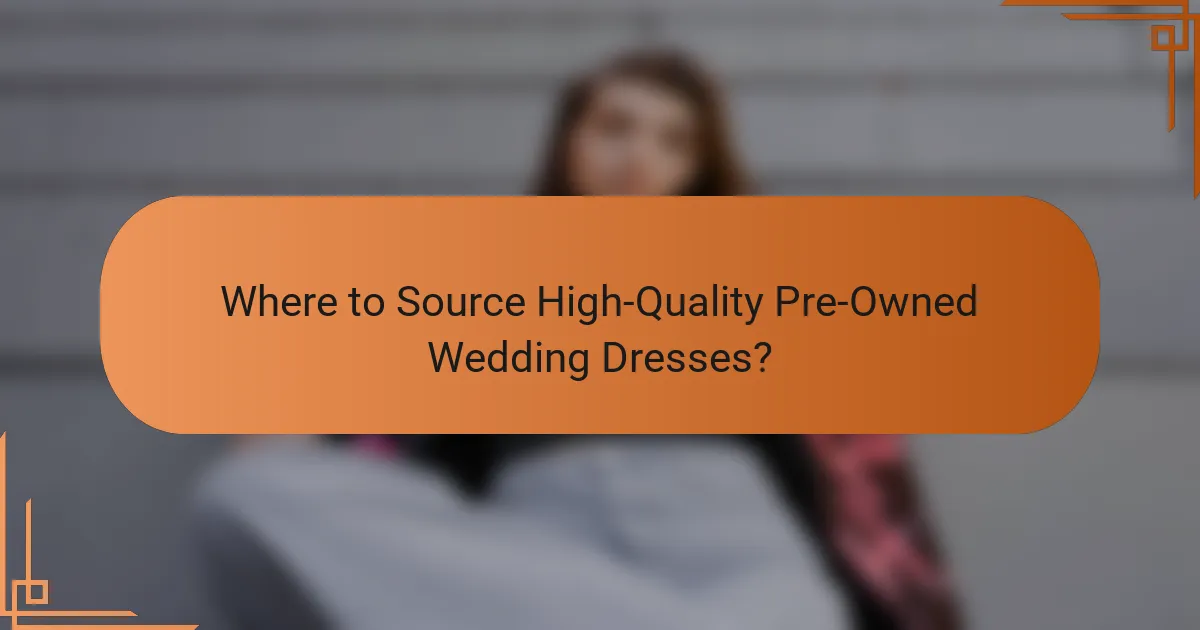
Where to Source High-Quality Pre-Owned Wedding Dresses?
High-quality pre-owned wedding dresses can be sourced from several reliable places. Online marketplaces like Stillwhite and PreOwnedWeddingDresses offer extensive selections. These platforms specialize in second-hand bridal wear. Additionally, consignment shops often carry gently used wedding gowns. Local bridal boutiques sometimes have pre-owned sections as well. Estate sales and auctions can yield unique finds. Social media groups focused on wedding attire are also valuable resources. Each option provides access to a variety of styles and price points.
What are the best places to find pre-owned wedding dresses?
The best places to find pre-owned wedding dresses include online marketplaces, consignment shops, and bridal boutiques specializing in second-hand gowns. Websites like Stillwhite, PreOwnedWeddingDresses, and OnceWed offer extensive listings of pre-owned dresses. Local consignment shops often carry a selection of gently used wedding dresses at reduced prices. Additionally, some bridal boutiques have sections dedicated to pre-owned dresses, ensuring quality and style. Social media platforms like Facebook Marketplace and Instagram can also be useful for finding local sellers. These options provide a range of styles and prices, making it easier to find the perfect dress.
How do online marketplaces compare to local boutiques?
Online marketplaces offer a wider selection than local boutiques. They provide access to numerous sellers and brands globally. Local boutiques typically carry a curated selection, focusing on specific styles or designers. Online marketplaces often feature competitive pricing due to various sellers. Local boutiques may have higher prices due to overhead costs and personalized service.
Online platforms allow for easy price comparison and customer reviews. This transparency can help buyers make informed decisions. Local boutiques often provide a tactile experience, allowing customers to see and try on dresses. Online marketplaces typically lack this physical interaction but may offer return policies.
Research shows that 70% of consumers prefer online shopping for convenience and variety. However, 60% still value the personalized experience offered by local boutiques. Each option has its advantages, depending on buyer preferences and priorities.
What should you consider when sourcing from private sellers?
When sourcing from private sellers, consider the seller’s reputation and feedback. Check online reviews and ratings from previous buyers. Verify the authenticity of the wedding dress by asking for original receipts or tags. Inspect the dress for any damage or alterations. Request detailed photographs to assess the dress’s condition. Understand the return policy before finalizing the purchase. Ensure clear communication regarding payment methods and shipping options. These steps help mitigate risks and ensure a satisfactory transaction.
What are the advantages of using trusted retailers for pre-owned dresses?
Using trusted retailers for pre-owned dresses ensures quality and authenticity. Trusted retailers typically offer verified products, reducing the risk of purchasing counterfeit items. They often provide detailed descriptions and high-resolution images, allowing buyers to assess the dress’s condition accurately. Additionally, these retailers usually have return policies, offering buyers peace of mind. Trusted retailers often have a reputation to uphold, which motivates them to maintain high standards in their inventory. Many also perform inspections and cleaning processes before resale, ensuring dresses are in excellent condition. According to a survey by the Fashion Institute of Technology, 70% of consumers prefer purchasing from reputable sources to avoid potential issues.
How do trusted retailers ensure the quality of their dresses?
Trusted retailers ensure the quality of their dresses through rigorous sourcing and inspection processes. They select dresses from reputable designers and brands known for their craftsmanship. Each dress undergoes a thorough inspection for fabric integrity, stitching quality, and overall condition. Trusted retailers also provide detailed descriptions and images to highlight any imperfections. They often have a return policy to guarantee customer satisfaction. Many retailers rely on customer reviews to maintain their reputation for quality. They may also offer alterations to enhance fit and appearance. This commitment to quality builds trust with customers and encourages repeat business.
What should you look for in a retailer’s return policy?
Look for a clear timeframe for returns in a retailer’s return policy. A standard period is typically 30 days. Ensure the policy specifies whether returns are accepted for refunds or exchanges. Check if the policy includes conditions for items that are worn or altered. Look for information on who pays for return shipping. Some retailers offer free returns, while others may charge. Verify if there are any exclusions for specific items. Items like accessories may have different return rules. Finally, ensure the policy is easily accessible and written in simple language. This clarity helps in understanding your rights as a consumer.
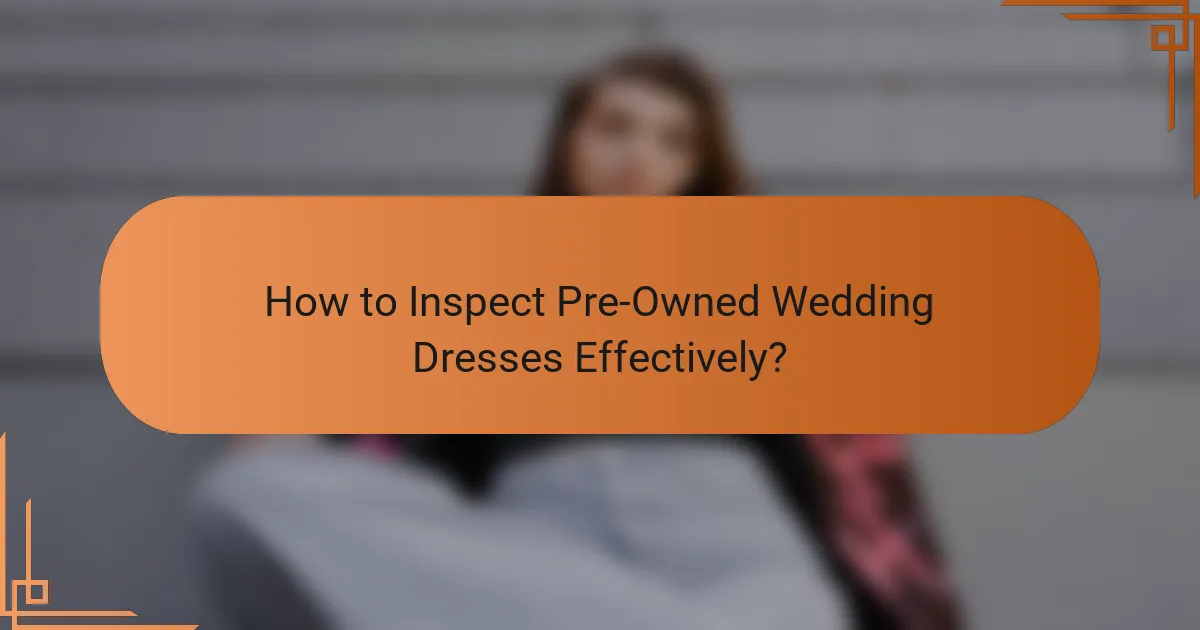
How to Inspect Pre-Owned Wedding Dresses Effectively?
To inspect pre-owned wedding dresses effectively, start by examining the fabric for any stains or discoloration. Look closely for signs of damage, such as tears or fraying seams. Check the lining for wear and ensure it is intact. Inspect the zipper and buttons to confirm they function properly. Look for any alterations, which may affect the fit. Assess the overall cleanliness of the dress. Consider the designer and original retail price, as reputable brands often indicate quality. Finally, request any available cleaning or repair history from the seller.
What inspection techniques should you use when evaluating a dress?
When evaluating a dress, use visual inspection, tactile inspection, and functional inspection techniques. Visual inspection involves examining the dress for stains, tears, or discoloration. Look closely at seams and hems for any signs of wear. Tactile inspection requires feeling the fabric for texture and weight. Check for any irregularities in stitching or fabric quality. Functional inspection assesses the dress’s fit and movement. Try on the dress to ensure comfort and proper sizing. These techniques help identify the dress’s overall quality and condition.
How can you check for signs of wear and tear?
To check for signs of wear and tear on pre-owned wedding dresses, examine the fabric closely. Look for fraying, discoloration, or thinning areas. Inspect seams for loose stitching or unraveling. Check the lining for any signs of damage or stains. Assess the zipper functionality and ensure it operates smoothly. Evaluate the overall structure for any misshaping or distortion. These checks help ensure the dress’s quality and longevity. Regularly, pre-owned dresses may show signs of wear due to previous use, making careful inspection essential.
What specific features should you inspect for quality assurance?
Inspect the fabric quality, seams, and overall construction of the wedding dress. Check for stains, discoloration, or damage on the fabric. Examine the seams for loose threads or fraying. Ensure zippers and buttons function properly. Look for any alterations that may affect the dress’s integrity. Verify the lining is intact and not torn. Assess the dress’s overall shape and fit to ensure it meets your expectations. Each feature directly impacts the dress’s quality and longevity.
What questions should you ask the seller before purchasing?
What questions to ask the seller before purchasing include the dress’s condition, alterations made, and original purchase price. Inquire about the dress’s history and how many times it has been worn. Ask if there are any stains, damages, or repairs needed. Confirm the return policy and whether the seller offers a cleaning service. Understanding the fabric type and care instructions is also important. These questions help ensure you make an informed decision.
How can you verify the dress’s history and condition?
To verify the dress’s history and condition, examine its labels and tags for authenticity. Look for designer labels, care instructions, and size tags, as these indicate the dress’s origin. Request a provenance statement from the seller, detailing previous ownership and any alterations made. Inspect the dress physically for signs of wear, such as fabric fraying, discoloration, or stains. Check for any repairs or alterations that may affect its value. Additionally, research online for similar dresses to compare condition and pricing. Utilize trusted platforms or retailers known for pre-owned wedding dresses for reliable sourcing. These steps ensure you have a comprehensive understanding of the dress’s history and current state.
What are the essential details regarding alterations and sizing?
Alterations and sizing are crucial for ensuring a perfect fit in pre-owned wedding dresses. Most gowns require some level of alteration to accommodate individual body shapes. Common adjustments include hem length, bust size, and waistline modifications.
Sizing can vary significantly between designers, so it is essential to refer to specific size charts. Brides should always try on dresses before purchasing to assess fit. Professional tailors can provide expert alterations, enhancing comfort and appearance.
According to a survey by The Knot, 60% of brides have their wedding dresses altered. This statistic underscores the importance of considering alterations when selecting a gown.
What are some best practices for ensuring a successful purchase?
To ensure a successful purchase, research the product thoroughly before buying. Understand the quality and condition of pre-owned wedding dresses. Check for reputable sellers with positive reviews. Ask for detailed photos and descriptions of the dress. Verify the return policy in case the dress does not meet expectations. Ensure accurate measurements are provided and compare them with your own. Request information regarding any alterations made to the dress. These practices help minimize risks and enhance satisfaction with the purchase.
How can you negotiate the price effectively?
To negotiate the price effectively, research the market value of similar pre-owned wedding dresses. This information will provide a solid foundation for your negotiation. Approach the seller with confidence and clearly state your offer based on your research. Highlight any flaws or necessary repairs to justify a lower price. Be polite and respectful during the negotiation process. Listening to the seller’s perspective can also reveal their flexibility on price. Establish a rapport to create a positive negotiation environment. Lastly, be prepared to walk away if the price does not meet your budget. This strategy can often lead to a better deal.
What steps should you take after purchasing a pre-owned wedding dress?
Immediately inspect the pre-owned wedding dress for any damages. Check for stains, tears, or loose threads. Clean the dress according to the fabric care instructions. Consider professional cleaning for delicate fabrics. Next, try the dress on to ensure proper fit. If alterations are needed, schedule an appointment with a tailor. Store the dress in a cool, dry place to prevent damage. Finally, document any alterations or cleaning for future reference.
High-quality pre-owned wedding dresses are previously worn gowns that retain excellent condition and craftsmanship, often featuring designer labels and unique styles. This article provides essential tips for sourcing these dresses, including online marketplaces, consignment shops, and trusted retailers, while emphasizing the importance of inspecting the dress for quality assurance. Key considerations include understanding the dress’s history, evaluating alterations and sizing, and utilizing effective negotiation techniques. Additionally, the article highlights the financial and sustainability benefits of choosing pre-owned wedding dresses, making them an attractive option for brides.
